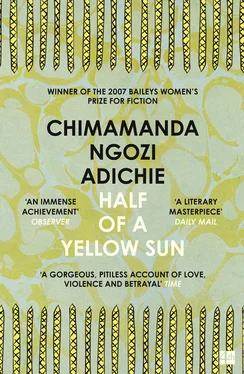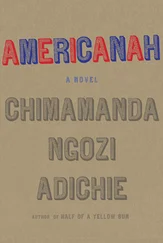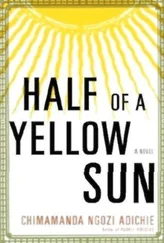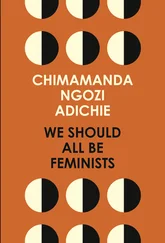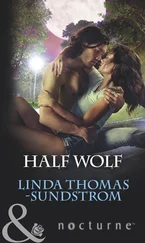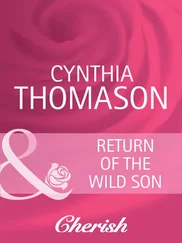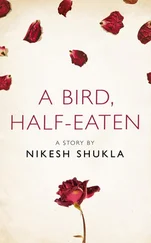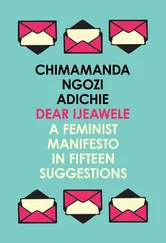There was Okeoma, who came most often and stayed the longest. He looked younger than the other guests, always wore a pair of shorts, and had bushy hair with a parting at the side that stood higher than Master’s. It looked rough and tangled, unlike Master’s, as if Okeoma did not like to comb it. Okeoma drank Fanta. He read his poetry aloud on some evenings, holding a sheaf of papers, and Ugwu would look through the kitchen door to see all the guests watching him, their faces half frozen, as if they did not dare breathe. Afterwards, Master would clap and say, in his loud voice, ‘The voice of our generation!’ and the clapping would go on until Okeoma said sharply, ‘That’s enough!’
And there was Miss Adebayo, who drank brandy like Master and was nothing like Ugwu had expected a university woman to be. His aunty had told him a little about university women. She would know, because she worked as a cleaner at the Faculty of Sciences during the day and as a waitress at the staff club in the evenings; sometimes, too, the lecturers paid her to come in and clean their homes. She said university women kept framed photos of their student days in Ibadan and Britain and America on their shelves. For breakfast, they had eggs that were not cooked well, so that the yolk danced around, and they wore bouncy, straight-hair wigs and maxi-dresses that grazed their ankles. She told a story once about a couple at a cocktail party in the staff club who climbed out of a nice Peugeot 404, the man in an elegant cream suit, the woman in a green dress. Everybody turned to watch them, walking hand in hand, and then the wind blew the woman’s wig off her head. She was bald. They used hot combs to straighten their hair, his aunty had said, because they wanted to look like white people, although the combs ended up burning their hair off.
Ugwu had imagined the bald woman: beautiful, with a nose that stood up, not the sitting-down, flattened noses that he was used to. He imagined quietness, delicacy, the kind of woman whose sneeze, whose laugh and talk, would be soft as the under feathers closest to a chicken’s skin. But the women who visited Master, the ones he saw at the supermarket and on the streets, were different. Most of them did wear wigs (a few had their hair plaited or braided with thread), but they were not delicate stalks of grass. They were loud. The loudest was Miss Adebayo. She was not an Igbo woman; Ugwu could tell from her name, even if he had not once run into her and her housegirl at the market and heard them both speaking rapid, incomprehensible Yoruba. She had asked him to wait so that she could give him a ride back to the campus, but he thanked her and said he still had many things left to buy and would take a taxi, although he had finished shopping. He did not want to ride in her car, did not like how her voice rose above Master’s in the living room, challenging and arguing. He often fought the urge to raise his own voice from behind the kitchen door and tell her to shut up, especially when she called Master a sophist. He did not know what sophist meant, but he did not like that she called Master that. Nor did he like the way she looked at Master. Even when somebody else was speaking and she was supposed to be focused on that person, her eyes would be on Master. One Saturday night, Okeoma dropped a glass and Ugwu came in to clean up the shards that lay on the floor. He took his time cleaning. The conversation was clearer from here and it was easier to make out what Professor Ezeka said. It was almost impossible to hear the man from the kitchen.
‘We should have a bigger pan-African response to what is happening in the American South really –’ Professor Ezeka said.
Master cut him short. ‘You know, pan-Africanism is fundamentally a European notion.’
‘You are digressing,’ Professor Ezeka said, and shook his head in his usual superior manner.
‘Maybe it is a European notion,’ Miss Adebayo said, ‘but in the bigger picture, we are all one race.’
‘What bigger picture?’ Master asked. ‘The bigger picture of the white man! Can’t you see that we are not all alike except to white eyes?’ Master’s voice rose easily, Ugwu had noticed, and by his third glass of brandy, he would start to gesture with his glass, leaning forwards until he was seated on the very edge of his armchair. Late at night, after Master was in bed, Ugwu would sit on the same chair and imagine himself speaking swift English, talking to rapt imaginary guests, using words like decolonize and pan-African , moulding his voice after Master’s, and he would shift and shift until he too was on the edge of the chair.
‘Of course we are all alike, we all have white oppression in common,’ Miss Adebayo said dryly. ‘Pan-Africanism is simply the most sensible response.’
‘Of course, of course, but my point is that the only authentic identity for the African is the tribe,’ Master said. ‘I am Nigerian because a white man created Nigeria and gave me that identity. I am black because the white man constructed black to be as different as possible from his white . But I was Igbo before the white man came.’
Professor Ezeka snorted and shook his head, thin legs crossed. ‘But you became aware that you were Igbo because of the white man. The pan-Igbo idea itself came only in the face of white domination. You must see that tribe as it is today is as colonial a product as nation and race.’ Professor Ezeka recrossed his legs.
‘The pan-Igbo idea existed long before the white man!’ Master shouted. ‘Go and ask the elders in your village about your history.’
‘The problem is that Odenigbo is a hopeless tribalist, we need to keep him quiet,’ Miss Adebayo said.
Then she did what startled Ugwu: she got up laughing and went over to Master and pressed his lips close together. She stood there for what seemed a long time, her hand to his mouth. Ugwu imagined Master’s brandy-diluted saliva touching her fingers. He stiffened as he picked up the shattered glass. He wished that Master would not sit there shaking his head as if the whole thing were very funny.
Miss Adebayo became a threat after that. She began to look more and more like a fruit bat, with her pinched face and cloudy complexion and print dresses that billowed around her body like wings. Ugwu served her drink last and wasted long minutes drying his hands on a dishcloth before he opened the door to let her in. He worried that she would marry Master and bring her Yoruba-speaking housegirl into the house and destroy his herb garden and tell him what he could and could not cook. Until he heard Master and Okeoma talking.
‘She did not look as if she wanted to go home today,’ Okeoma said. ‘ Nwoke m , are you sure you are not planning to do something with her?’
‘Don’t talk rubbish.’
‘If you did, nobody in London would know.’
‘Look, look – ’
‘I know you’re not interested in her like that, but what still puzzles me is what these women see in you.’
Okeoma laughed and Ugwu was relieved. He did not want Miss Adebayo – or any woman – coming in to intrude and disrupt their lives. Some evenings, when the visitors left early, he would sit on the floor of the living room and listen to Master talk. Master mostly talked about things Ugwu did not understand, as if the brandy made him forget that Ugwu was not one of his visitors. But it didn’t matter. All Ugwu needed was the deep voice, the melody of the English-inflected Igbo, the glint of the thick eyeglasses.
He had been with Master for four months when Master told him, ‘A special woman is coming for the weekend. Very special. You make sure the house is clean. I’ll order the food from the staff club.’
‘But, sah, I can cook,’ Ugwu said, with a sad premonition.
Читать дальше
